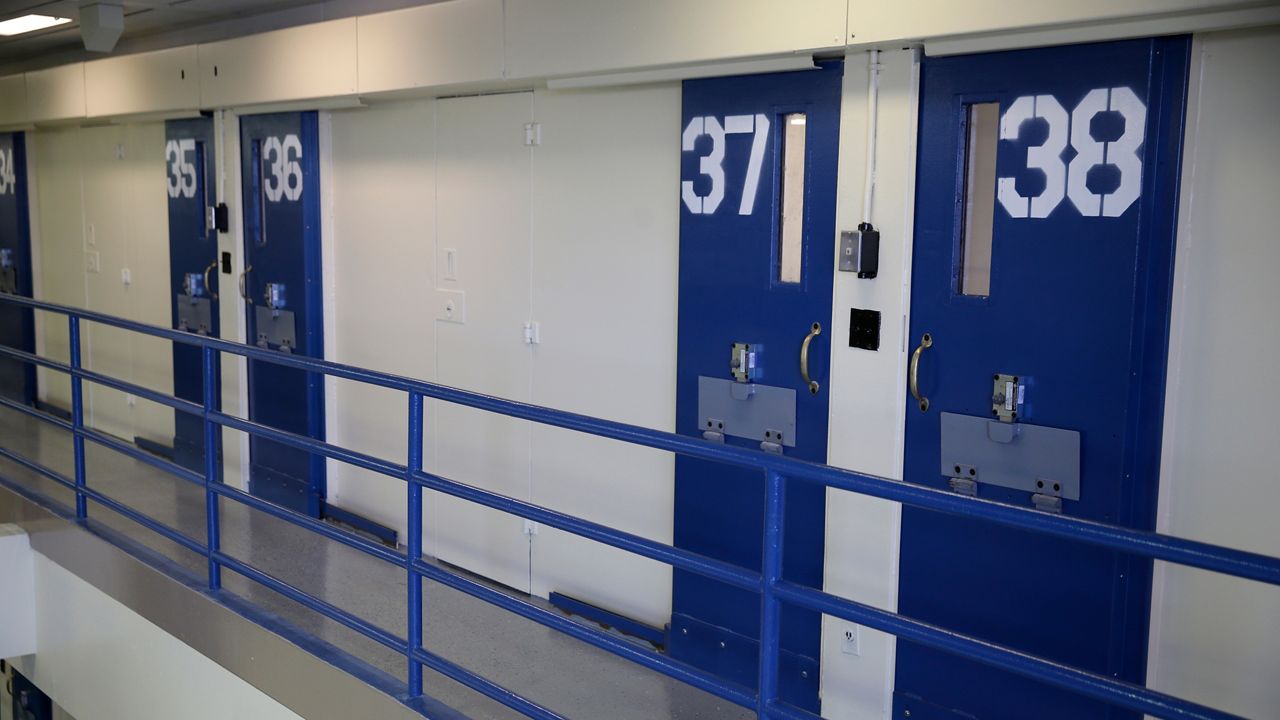SPECIAL EDITION - New York City has become the epicenter of the coronavirus pandemic, with thousands of deaths and local hospitals overwhelmed. As the virus spread throughout the city, no battle has become quite as challenging as the one being waged inside city jails, where people are packed into close quarters and social distancing isn't always an option.
In a special edition of the podcast, NY1's Courtney Gross takes us behind bars on Rikers Island, where inmates, correction officers, and medical staff are all trying to reduce the spread of the virus.
If you want to read the full report, scroll down.
We want to hear how you're coping with the coronavirus pandemic:
Twitter: #NY1OffTopic or @ZackFinkNews, @JuanMaBenitez, and @Courtneycgross
Leave a message: 212-379-3440
Email: yourstoryny1@charter.com
For more information: ny1.com/offtopic
For more information on the new coronavirus, head to ny1.com/coronaviruscoverage and ny1.com/coronavirus
ABOUT THE SHOW
What happens when three New York reporters sit in a (small) room and talk politics? Join host Zack Fink and the NY1 political team each week for a conversation where no topic is off limits and everything is on the record.
HOW TO LISTEN
FULL REPORT
Rikers Island, the sprawling jail complex, is in an indefinite state of lockdown. No visitors — not even attorneys — can step inside. When correction officers come to work a shift, they are supposed to get their temperatures taken.
There are hundreds of coronavirus cases on the island. It seems almost more isolated from the rest of New York City now than before, if that was even possible. A virus is spreading on 400 acres, inaccessible across a massive bridge and checkpoints.
- LIVE UPDATES: Coronavirus in New York City
- LIVES LOST: Remembering Victims of the Coronavirus
- What to Do If You Test Positive for COVID-19
- CDC Coronavirus Page
- WHO Coronavirus Page
Correction officers, inmates, doctors, and nurses are all battling COVID-19, trying to reduce the spread of the virus among thousands of inmates and employees.
NY1 has received calls from behind bars for weeks. Some of these people have been released, some are still there, and some got sick.
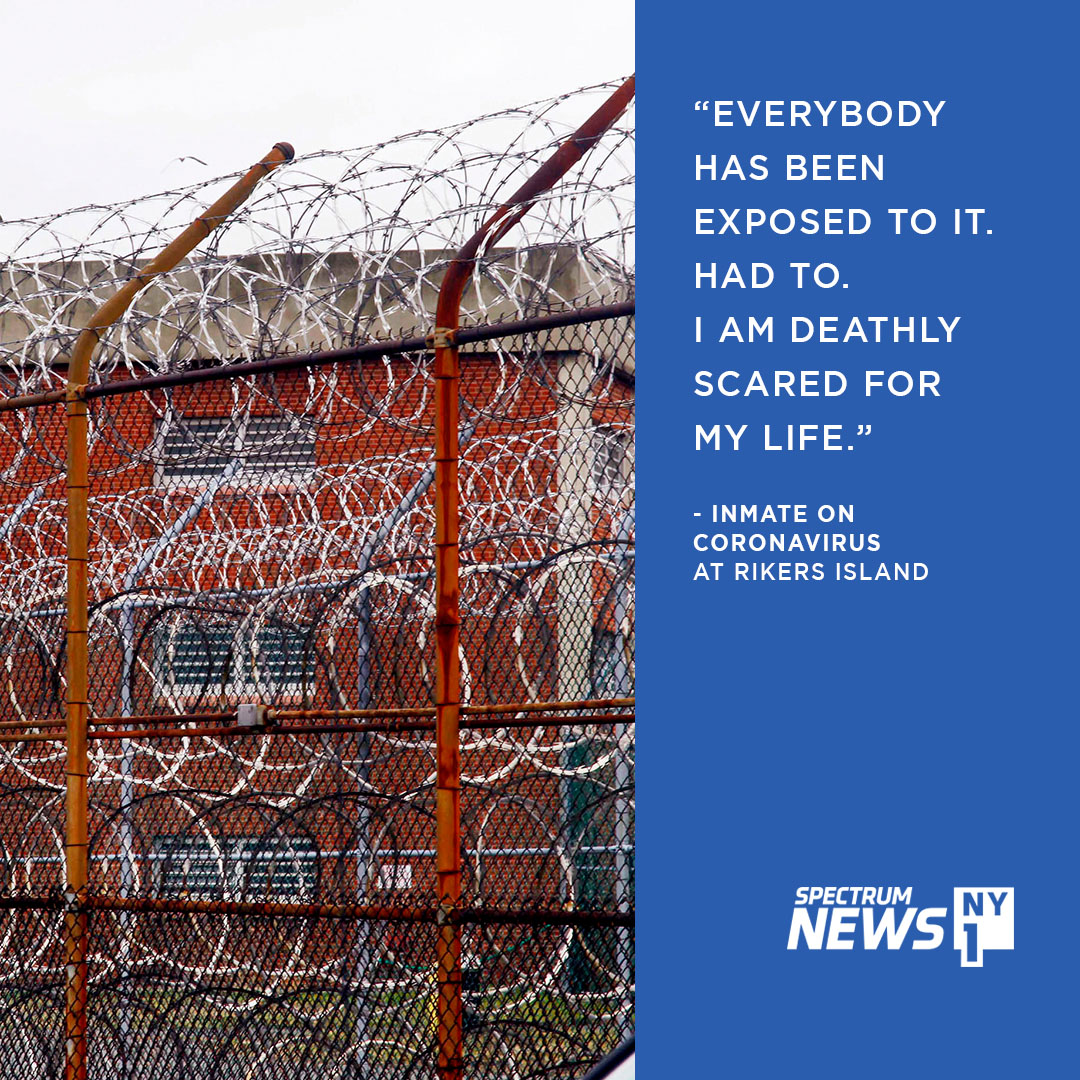
Tiffany Gaines was on Rikers for a parole violation. She had been there since just after Valentine’s Day. She failed a drug test for marijuana. She is five months pregnant and has asthma.
At the end of March, while she was sitting on Rikers Island, it also became clear she had COVID-19.
Gross: "And where are you?"
Gaines: "I am in West Facility on Rikers."
Gross: "And where did you test positive for coronavirus?"
Gaines: "I took the test on Thursday. It came back positive on Friday."
On March 18, Rikers had its first case among the inmate population. Gaines tested positive almost two weeks later.
Gaines: "I had shortness of breath and stuff, and it was messing with my asthma. My oxygen got very low. My blood pressure was very low. They had to put me on an oxygen tank … They put a mask on my face to help me breathe."
Gaines: "They had to call a medical emergency for me. Like I said, I am pregnant and it was affecting a lot."
Gross: "How do you think you got the coronavirus?"
Gaines: "Being in that facility, they kept me in the same unit [where]…like nine people tested positive. They were hiding everything from us, but we wound up finding out. It took nine people for them to give us a face mask. And they still kept people in the dorm area without it being sanitized or nothing. They tried to say we were quarantining, but that was never a proper way of quarantining anybody in the dorm area together. They say practice social distancing — our beds aren’t six feet apart. They treat us like we gave it to ourselves. Like, nobody wants to come to our unit. Officers are getting suspended because they don't want to come to our unit."
Gaines: "It’s no type of care. I was spotting. They didn't want to send me out. I was assaulted by an officer and everything. He didn't want me to keep asking for medical and everything. I have bruises from the handcuffs they tried to put on me. My skin is broken from it."
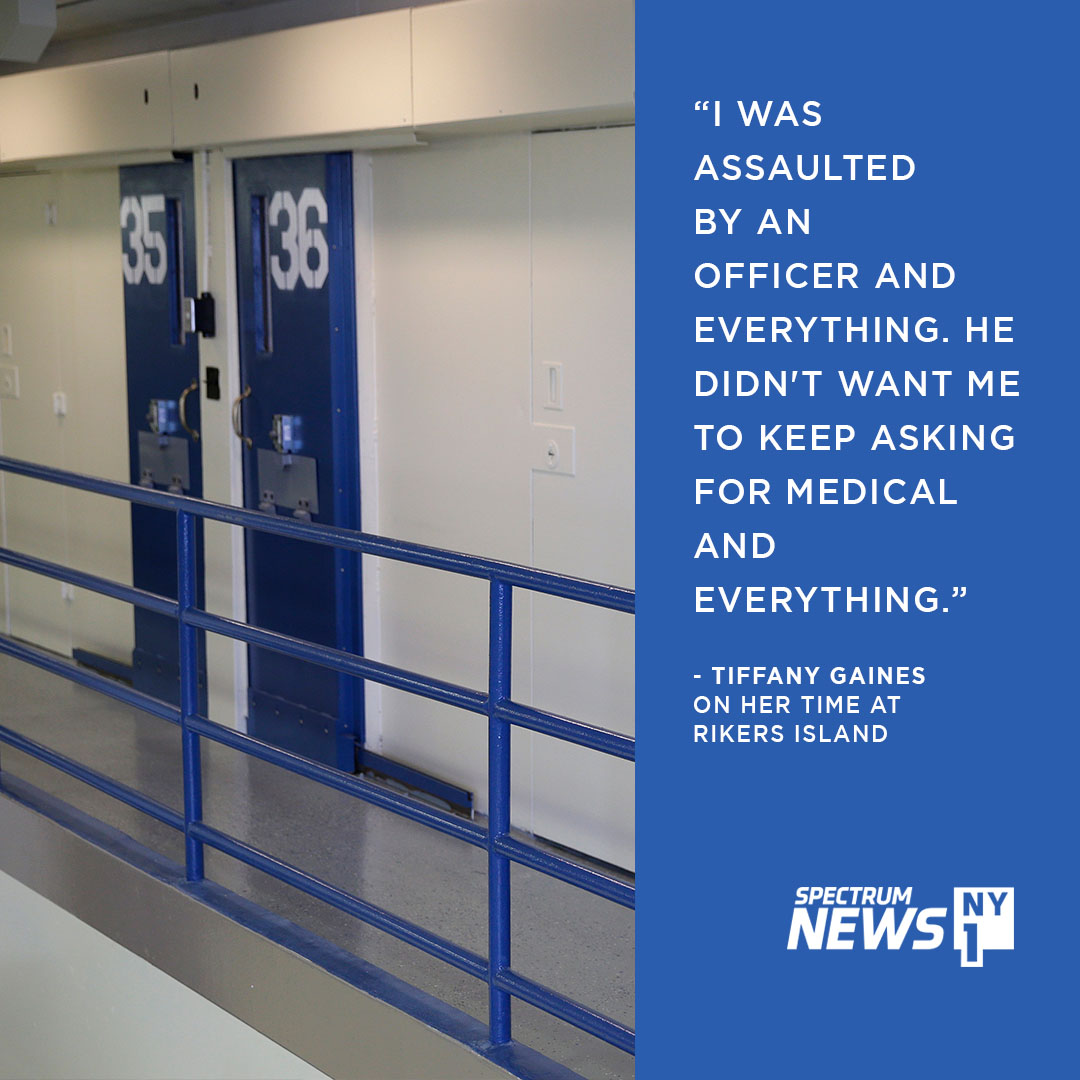
Gross: "How many women are there? And are you all in individual cells?"
Gaines: "Yes, it's isolation. Two left yesterday. There are probably like seven or eight."
Gross: "And everyone’s sick?"
Gaines: “Yes."
At the beginning of the outbreak, the inmates themselves were not provided gloves or masks. Most officers were not really getting personal protective equipment (PPE), either.
We heard that story countless times. That includes vulnerable people, too. Michael did not want to give us his last name. He had landed on Rikers in the beginning of March, just before COVID-19 hit.
“It’s kind of frustrating because I have a lot of issues going on health-wise and I’m still here,” he said. “All the issues they are talking about on the news, I basically have three of them. I have heart disease, I have a stent in my heart, and I also have diabetes. And I am still sitting here. I feel like a ticking time bomb.”
Ten days later, the city changed the policy: masks would be provided to everyone.
In mid-March, about 5,500 inmates were in city jails. By mid-April, there were less than 4,000. That is Rikers’s lowest inmate population since the 1940s. At least 1,400 people have been released — offenders sent home early to stop the spread of COVID-19.
“Everyone's been working together to make sure that we keep everyone at Rikers safe and the whole correction system; that we release people who can be appropriately released, particularly those who have the most serious medical conditions; and obviously continue to provide health care for those who are incarcerated, working with H + H, with Correctional Health,” Mayor Bill de Blasio said on April 13. “That whole team’s been working together constantly.”
We know there are a lot of numbers flying around: confirmed cases, hospitalizations, and deaths.
The impact on Rikers can be measured in another way: on April 10, 118 housing areas in city jails were quarantined for likely exposure. That means on that day, more than half of the city’s jail population was on lockdown for exposure to COVID-19.
“Our dorm, it literally has a sign right now that says, ‘Approach with precautions, asymptomatic due to COVID-19,’” Servincy Edmond said. “We’ve been exposed pretty much, exposed to COVID-19. I’m like, wow.”
Edmond has been on Rikers since New Year’s Day. He was on parole, then picked up on a new charge for burglary, and now he’s sleeping in a quarantined dorm with about 30 other men.
“They are waiting for most of us to start dying to start doing the release process. I just don't get it,” Edmond said. “Social distancing is not being implemented. It’s even a headache sometimes to get cleaning supplies. The clinic over here is — you’ll die before you even make it to the clinic."
The Department of Correction says it is doing what it can to spread detainees apart. That includes opening up an old jail on Rikers Island to house people who are symptomatic or tested positive.
Officials say they are sanitizing housing areas once a day — “they” in this case are the inmates themselves. They do the cleaning.
The Department of Correction claims it’s separating inmates the best it can — “where possible,” officials say, they put a bed between inmates in dorms. They are painting social distance cues on benches in day rooms and intake areas. Officials say the island is not a Petri dish — they are taking care of their inmates and staff in trying times.
Detainees tell us a different story.
“What we try to do ourselves is, we try to skip a bunk so certain inmates will be separated,” Edmond said. “We can only do so much.”
“And the masks they are giving us are the little flimsy ones with the two straps on the side, the baby blue ones,” Edmond said. “We’re not getting any help in here. And parole, I don’t know what they are doing with us. It’s like they are playing games with us, they’re trying to see who’s going to die, who’s not going to die.”
Gross: "Do you have underlying health conditions?"
Edmond: "Yes, I’m diabetic."
A division of the city’s hospital system is charged with caring for the inmates on Rikers Island. It is trying to contain the outbreak. At least 155 of its staff members have gotten sick.
“I think with any city agency right now, we are of course seeing staff members get sick. It’s a real challenge for any health care service,” said Dr. Zachary Rosner, the chief of medicine for Correctional Health Services. “But we are making sure to support our staff and make sure they have protection, to make sure that we set up our systems in a way that we can protect our staff and make sure we can continue services. We have done pretty well, I think, compared to other systems.”
In a nutshell, Rikers is about containment and control. Rosner has to control a virus that doesn’t want to be contained behind bars.
He said: "What’s important in our setting is to continue to find ways to monitor patients. And that’s included. And that’s included [in] things like…bringing service to patients. Because every movement around this facility means that there is some risk to that patient or to other people who might be exposed to the virus. So, as much as possible, we try to bring services, especially to patients who are confirmed to be positive."
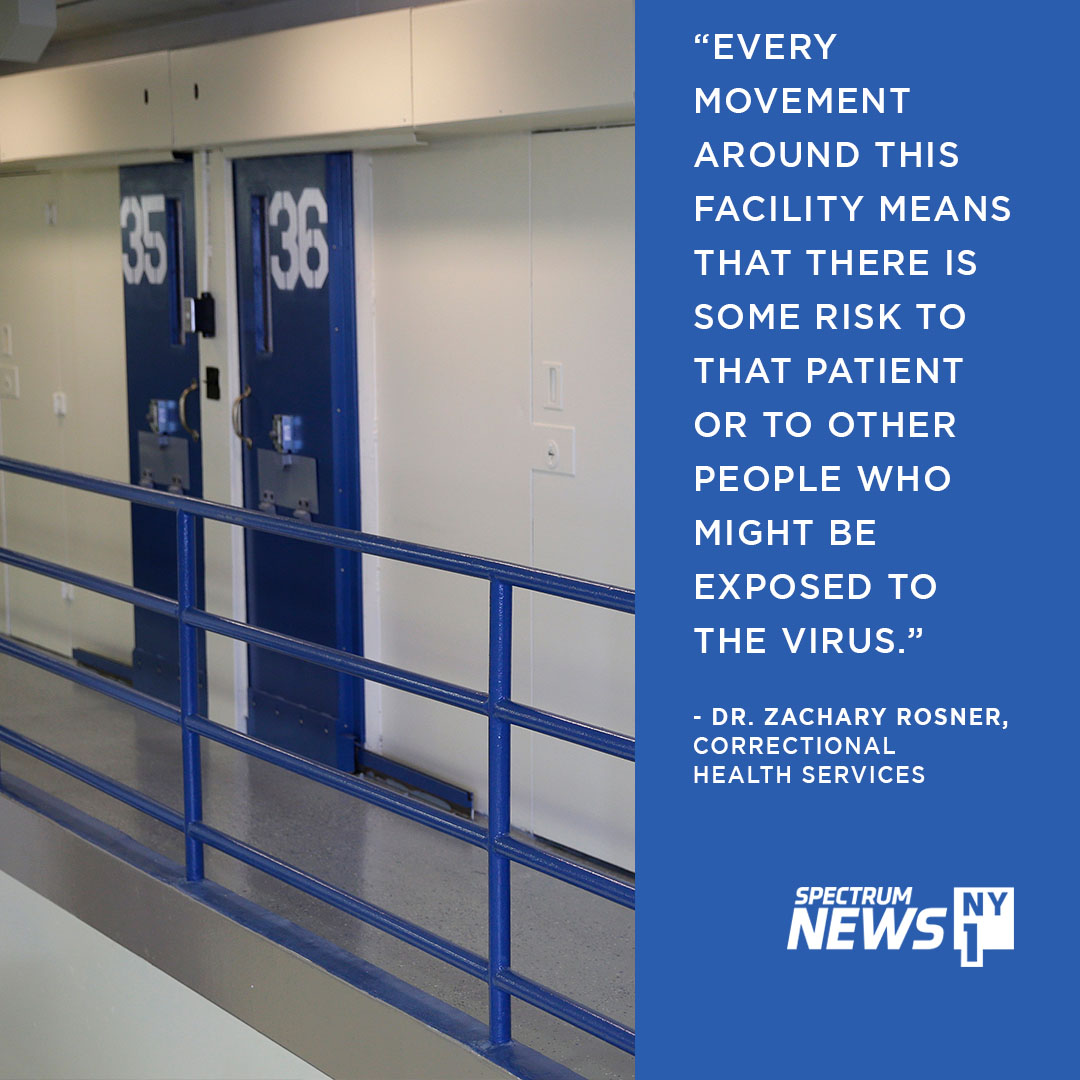
Gross: "How bad do think it is there now?"
Rosner: "That’s a hard question to answer. I don’t know if any public health situation that’s been terrible can be summarized in a kind of a good or bad situation. But, as I mentioned before, I feel, and I am, seeing tremendous work happening at the ground level from health care providers around the system to keep patients safe, and to really educate on the risks inherent in congregant settings like jails or nursing homes or homeless shelters. And to that level, we’re hopeful that our patients are increasingly protected and getting what they need."
There’s another side to this situation. What about the other side of the cell?
“Wednesday was when it was the worst. I couldn’t get out of bed those two days,” a correction officer told us. “It felt like I got run over by a truck. I felt like something was inside of me, trying to rip me apart, because everything, from my head to toe, was in pain.”
We are not revealing the correction officer’s name because he fears retribution. He has been out sick with COVID-19 for a few weeks. He was ordered back to work after two. He was still positive for the virus.
“I interacted with a lot of the inmates that had tested positive. One of them that we all know was Harvey Weinstein. I interacted with him a few times,” the officer said. “I was the mail room officer, so I have to go to each individual inmate and open it in front of them and hand it to them.”
Gross: "And how do you think the department is trying to curtail the spread of the virus on the island, or do you think they are not?"
Officer: "In my situation, I don’t think that they are, because they were trying to send me back to work positive. I don't know what kind of precautions they are taking to prevent that. But obviously they are not if I'm getting sent back to work sick."
Gross: "Given that, how do you think, has there been any plan from the department to try to stop the spread of the virus? Especially among employees — well, among employees and inmates, it seems to have spread among both populations pretty easily. Why is that?"
Officer: "Everybody is on top of each other in the jails. It’s not a place that's open. And the air in there is just recycling, there is no real ventilation in there. It feels stuffy in there. Everyone is on top of each other. When you have to escort an inmate, you have to put your hands on them. You have to be on top of each other. So it’s pretty much impossible to prevent the spread."
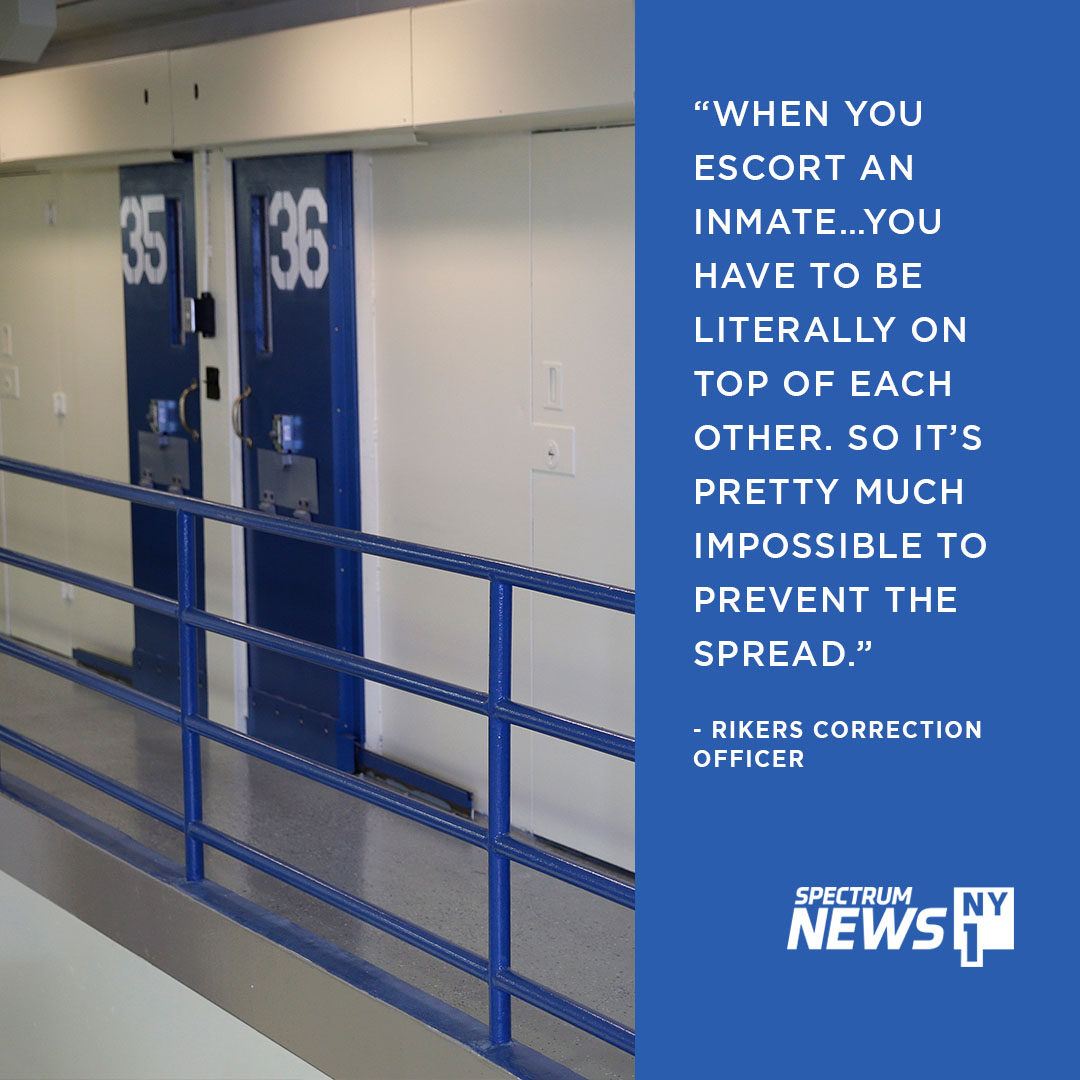
By April 24, 373 inmates had tested positive for COVID-19 in New York City jails. At the same time, 918 Department of Correction staff were positive. At least three inmates and nine staff members had died.
Elias Husamudeen leads the city correction officers’ union. The union has sued the city multiple times during the pandemic over unsafe work conditions. The union head is brash and tough.
“This morning, I, the president, went to EMTC, where the inmates who are confirmed with the COVID-19 are housed. I went there this morning, I toured for hours, and the intake areas have not been sanitized, the clinic areas have not been sanitized,” Husamudeen said. “According to the department, they are sanitizing the areas approximately three times a day, each tour. Well, I am telling you there are still feces on the wall, on the gates of the facility that I just toured, EMTC. I am telling you that officers have gloves and masks and hand sanitizers that were provided to them by the union, and that the Department of Corrections is not providing correction officers PPE on a consistent basis.”
“The fact is they are lying about what they’re doing. They are inconsistent, Courtney,” Husamudeen continued. “You can’t give me gloves on Monday, and then when I come back on Tuesday you don't provide me with gloves.”
The city later agreed to provide masks for officers and access to tests at urgent care clinics, if an officer had symptoms or was exposed to the virus.
Perhaps getting most attention, both positive and negative, is the decision by city officials to reduce the inmate population on Rikers, letting people out early.
“So, as you know, I have been calling on the city to help reduce the population in Rikers Island,” Eric Gonzalez said. “In fact, as the elected DA of Brooklyn, I have taken policies in my own office to help reduce our reliance on incarceration in general.”
On one hand, Gonzalez wants to get vulnerable people off of Rikers to protect them from the coronavirus.
On the other, he signed a letter with all the other district attorneys in the city raising concerns about the whole process — whether it was jeopardizing public safety.
By mid-April, about 1,400 people had been released from city jails.
Gonzalez: "I was very concerned about what I was hearing. We have to be very clear here: the population from Rikers Island from Brooklyn is a population being charged with serious violent crimes: homicides, rapes. We have very few people in Rikers Island from Brooklyn that are being charged with nonviolent crimes."
Gonzalez: "We had to make sure that we could do everything we needed to do to reduce the population as DAs. But we know we have a population that’s not going to be released, and I wanted to know what were the plans on Rikers Island, the specific plans for treatment and oversight of anyone who may be exposed to COVID-19 or contracts COVID-19, and what the policy was going to be for reviewing who gets released."
Gonzalez: "We know they are not all going to get released and we wanted to make sure we could release those who we could. So after being told people were going to get released without any supportive housing, with any continuation of supervised release that had been discontinued, that there would be no drug programs, no mental health programs for them to attend — so we had serious concerns about release."
Gonzalez: "And I really want them to be separate and apart from those we know could be safely released. So we worked with the defenders and the courts to release as many people from Brooklyn that we thought we could manage safely and supervise appropriately on the outside. That included a number of cases where there may have been acts of domestic violence, and we had to do notification to the victims and survivors of those crimes and we had to make sure the victims had orders of protection in effect."
Gross: "There was a question of whether or not the city could adequately care for people on Rikers Island. Do you think the city can adequately care for people on Rikers Island?"
Gonzalez: "I think the city can care for many of the people on Rikers Island who do not have pre-existing health conditions or are not vulnerable to COVID-19. The city assures us they have done whatever they can. They have opened additional facilities up. They have distance between where people sleep. They are doing different contingency planning to try to socially separate people, put physical space between them as possible."
Gonzalez: "However, I do believe there is a category of sick people that are already locked up on Rikers Island that the city cannot guarantee their safety if they get sick. We want to make sure we’re not doing anything that’s going to cause that small population of sick prisoners to then get COVID and to then wind up in a public hospital, which may or may not be able to take them. For a very small population on Rikers Island, I have great concerns about their safety and that’s why I am doing everything in my power to deal with that urgency."
NY1 asked the city and the state for a list of people they’ve released from city jails. They have yet to give us one.
We asked the Department of Correction to sit down with us to discuss all of this. Officials there declined.
There’s a lot of uncertainty right now: When will this be over? When will New York City get back to normal? Will it ever?
This virus continues to tighten its grip on our lives — in the outside world and behind bars. That is something we all have in common.
------
Looking for an easy way to learn about the issues affecting New York City?
Listen to our "Off Topic/On Politics" podcast: Apple Podcasts | Google Play | Spotify | iHeartRadio | Stitcher | RSS
-----
FURTHER CORONAVIRUS COVERAGE
What to Do If You Test Positive for COVID-19
How Hospitals Protect Against the Spread of Coronavirus
Coronavirus Likely Spreads Without Symptoms
Coronavirus: The Fight to Breathe
Cuomo Orders Non-Essential Workers to Stay Home
NYC Businesses to Be Fined If Caught Price Gouging Face Masks
MTA Crews Cleaning to Prevent Coronavirus Spread
Cuomo Granted Broad New Powers as New York Tackles Coronavirus



